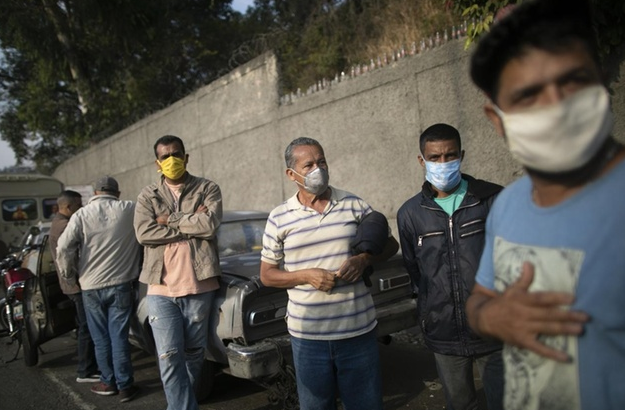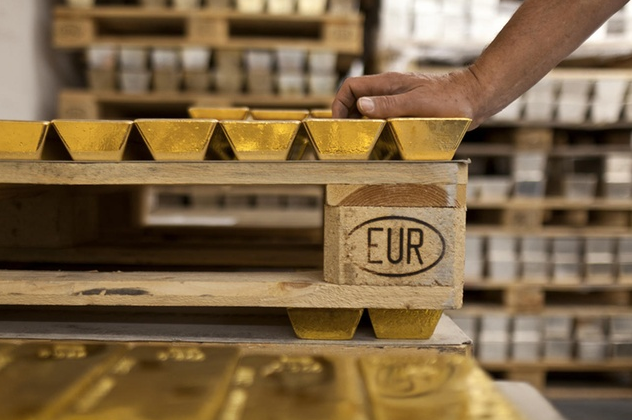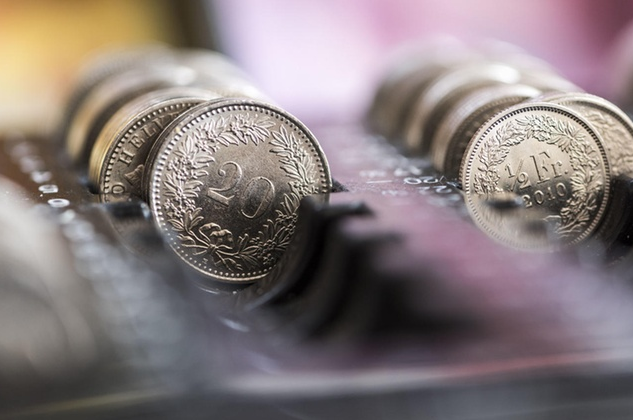Venezuela has the largest oil reserves in the world, but motor fuel has grown increasingly scarce in the past year due to US sanctions aimed at ousting President Nicolas Maduro (Copyright 2020 The Associated Press. All Rights Reserved.) Several Swiss companies and banks have found themselves in the line of fire as the United States ramps up pressure on the Venezuelan government. Washington has sanctioned numerous top officials for money laundering and drug trafficking in the oil-rich but economically flailing Latin American nation. The Venezuelan economy is in tatters after years of mismanagement and corruption. Record-low oil prices have dealt a further blow and the global spread of Covid-19 is expected to have a catastrophic humanitarian effect in a country
Topics:
Swissinfo considers the following as important: 3.) Swiss Info, 3) Swiss Markets and News, Featured, Law and order, newsletter
This could be interesting, too:
Nachrichten Ticker - www.finanzen.ch writes Die Performance der Kryptowährungen in KW 9: Das hat sich bei Bitcoin, Ether & Co. getan
Nachrichten Ticker - www.finanzen.ch writes Wer verbirgt sich hinter der Ethereum-Technologie?
Martin Hartmann writes Eine Analyse nach den Lehren von Milton Friedman
Marc Chandler writes March 2025 Monthly

Venezuela has the largest oil reserves in the world, but motor fuel has grown increasingly scarce in the past year due to US sanctions aimed at ousting President Nicolas Maduro (Copyright 2020 The Associated Press. All Rights Reserved.)
Several Swiss companies and banks have found themselves in the line of fire as the United States ramps up pressure on the Venezuelan government. Washington has sanctioned numerous top officials for money laundering and drug trafficking in the oil-rich but economically flailing Latin American nation.
The Venezuelan economy is in tatters after years of mismanagement and corruption. Record-low oil prices have dealt a further blow and the global spread of Covid-19 is expected to have a catastrophic humanitarian effect in a country unable to meet its people’s basic needs. Meanwhile, a power struggle continues between President Nicolas Maduro and opposition leader Juan Guaido.
Last year, the administration of US President Donald Trump rolled out a package of measures to pressure Maduro out of power, including a ban on Venezuelan oil, which forced many traders to halt transactions with the country. But some, based in Switzerland, found workarounds.
Skirting oil sanctions
In February, the US sanctioned Russian oil giant Rosneft for buying crude oil through RTSA, a subsidiary unit in Geneva, from Petroleos de Venezuela S.A. (PdVSA) – the Venezuelan state oil company. In the past, RTSA has counted BP, ExxonMobil, Royal Dutch/Shell and Swiss-based traders Vitol, Glencore and Trafigura among its clients, according to Reutersexternal link.
Rosneft has been accused by the US of ship-to-ship transfers of Venezuelan oil to evade sanctions. This practice has been regularly employed for cargo originating from the South American nation since the introduction of US sanctions, according to an oil trader who asked not to be named due to the risks associated with the sanctions. The trader also said that “Venezuelans are so desperate” to sell their oil that they allow special off-takers to send it to China, for example, in a transaction where they only get paid by the trader and not by the buyer. This is to avoid a paper trail showing the source of the oil, the seller and the buyer.
Another practice to get around sanctions is what the trader called a quick “one-two deal” where the companies exist for the duration of a single oil purchase transaction and then disappear.
On March 12, the Geneva-based TNK Trading International (TTI), another Rosneft subsidiary, was targeted by the US for “brokering the sale and transport of Venezuelan crude oil”.
The Switzerland-based energy traders “handled a large percentage of Venezuela’s oil exports in 2019 and in January 2020, TTI bought nearly 14 million barrels of crude oil from Petroleos de Venezuela (PdVSA)”, according to the US Treasury Department.
“Ending operations”
Rosneft – led by a longtime associate of President Vladimir Putin – has since announced that it was ending operations in Venezuela and sold its assets, including trading operations, to an undisclosed state-owned Russian company.
The Geneva office of Rosneft Trading, located at the same address as TTI, did not reply to phone and e-mail requests from swissinfo.ch to comment about the sale and what it meant for its Geneva staff, listed onlineexternal link as numbering between 20 and 49.
When asked about the impact of US sanctions on trading companies, Florence Schurch, general secretary of the Swiss Trading and Shipping Association, an industry organisation, said “clearly US sanctions will have an impact on some Swiss-based companies”.
Schurch explained that STSA did not give advice or directives to its members on how to deal with the sanctions. “All STSA members are professional and know very well how to deal with sanctions and matters, and consult sanctions lists as part of their daily operations.”
Zug-based company with Maduro ties
Last month, another Swiss-based oil trader, Zug-registered Maroil Trading Inc., brokered the sale of 250,000 barrels of gasoline to Venezuela amid a major fuel shortage in the country, according to the AP.
Zug-registered Maroil Trading is owned by Wilmer Ruperti, a Venezuelan shipping entrepreneur and former tanker captain who the AP reports “has a history of coming to the rescue of Venezuela’s socialist government at critical junctures.”
During the presidency of Hugo Chavez, Ruperti chartered Russian tankers to deliver gasoline during a strike by PdVSA employees. More recently, he paid legal fees for members of Maduro’s familyexternal link who were charged with drug trafficking as part of a US investigation over “narco-terrorism”.
Neither Ruperti nor Maroil Trading responded to phone calls and three e-mail requests to answer questions about his Swiss operations.
The Swiss authorities do not appear to be investigating traders accused of breaching US sanctions on Venezuela. The Swiss attorney general’s office (OAG) told swissinfo.ch that “the OAG is not conducting any criminal proceedings at present against a commodities trading house that traded in the context of the Venezuelan oil market.”
Banking on a political elite
However, investigations have been launched into Swiss banking activities linked to Venezuela. Switzerland’s financial supervisory authority FINMA recently investigated a Venezuelan money laundering scheme involving a former employee at Swiss bank Julius Bär. The probe led to scrutiny of the bank’s lax management controlsexternal link after Matthias Krull, a German-Venezuelan banker working with Julius Bär, was sentenced to 10 years in jail in Florida for laundering money from so-called “bolichicos”, young businessmen close to the government.
Several of Krull’s former clients and individuals linked to them, including former presidential bodyguard-turned-Venezuelan finance minister Alejandro Andrade, are in custody in the United States for embezzlement and taking bribes linked to Venezuelan state funds. Andrade had 17 accounts with nine Swiss banks that he used to hide money.
Other former clients of Krull’s, cousins Francisco Convit and Alejandro Betancourt of the Venezuelan energy firm Derwick Associates, are also under US investigation for a money laundering scheme involving loans to PdVSA. The money was allegedly hidden in several Swiss banks, including the Geneva-based Compagnie Bancaire Helvétique, according to media reportsexternal link citing correspondence between US and Swiss authorities. Switzerland’s highest court ordered the release of bank records to the US Department of Justice as evidence in the case. Compagnie Bancaire Helvétique denies taking part in Derwick Associates’ money laundering scheme.
According to finews,external link Krull, who managed approximately $600 million at Julius Bär, was known as an “onboarding superstar” for business he was able to bring to Julius Bär from Latin America.
At the time of the alleged money laundering between 2009 and 2018, Julius Bär was turning tidy profits and Collardi, its star CEO, was earning praise as he moved the bank aggressively into emerging markets, particularly in Asia and Latin America. Collardi quit Julius Bär in 2017 to join private bank Pictet as a partner.
According to Bloombergexternal link and finnewsexternal link, Pictet partners were discussing damage control last month as FINMA pursues investigations into the roles played by employees at Julius Bär during the time that the laundering of some $1.2 billion linked to PdVSA took place.
Reputational fallout
“As soon as you start pulling on that thread of corruption in Venezuela, very quickly in that process you bump into Swiss banks,” explains Alek Boyd, a London-based journalist who investigates Venezuelan corruption.
Boyd, who edits news site infodioexternal link, explained that many private banks often hired Venezuelans or dual nationals to build business in the country.
“Onboarding clients from a country where huge amounts of money are being siphoned out in all manner of dodgy deals…calls into question the role of the banks with regard to anti-money laundering legislation,” he said. Boyd also questioned whether Swiss financial regulators had done enough to investigate individuals involved in such practices.
FINMA declined to comment on individuals potentially involved in money-laundering schemes.
A Swiss lawyer familiar with the involvement of Swiss financial institutions in Venezuela says banks were always keen to grab the business no matter which side of the political spectrum it came from in Venezuela. Once the end of Swiss banking secrecy became clear, the sector had to find ways to reinvent itself – and stay afloat.
“You take the money, because otherwise your bank may close,” the lawyer told swissinfo.ch, speaking on condition of anonymity so as not to expose clients.
Serge Steiner, head of communications for the Swiss Bankers Association, declined to comment on the actions of specific banks but stressed his group urges its members to abide by the rules. Failures to implement anti-money laundering and compliance measures are harmful to a sector with a long tradition in wealth management.
“It is about quality, not doing some fishy business,” he says. “[Unfortunately,] the James Bond image is still there, and it takes a long time to get rid of that. Every scandal, even the smaller ones, as well as the larger ones outside of Switzerland are definitely not helping and are harming our reputation.”
Venezuela’s oil, sanctions and Switzerland
Oil constitutes 99% of Venezuela’s export income, according to OPEC. But over the past decade, production has fallen steeply from 2.4 million barrels per day to just 700,000 per day in March, due in large part to mismanagement at the state oil company.
The US Energy Information Administration reported that in 2017 some 47% of Venezuelan oil shipments went to China and India. It is difficult to get a picture of how much of Venezuela’s oil is traded by companies in Switzerland, as the information is not made public by the mostly privately owned firms. Trafigura, a Geneva-based trader, bought 34,000 barrels of crude and other oil products before sanctions were imposed last year. Most of that was resold to US and Chinese refiners.
Tags: Featured,Law and order,newsletter








